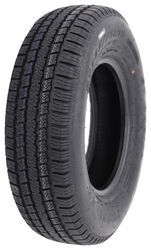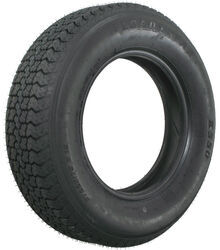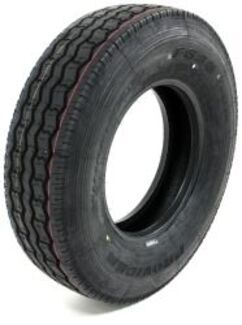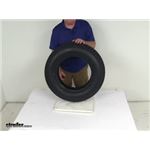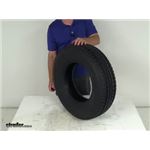
Blowout Damage Comparison Between Bias and Radial Tires
Question:
I had a 225/75R15 blowout last summer doing $3500 damage to my travel trailer. The tread with steel cord beat the trailer violently until I could get stopped. I have been told by a commercial driver I should use bias ply trailer tires to avoid such damage in the future. He said bias ply tire failures come apart in chunks without that flap beating on the trailer until I stop. Do you believe this is a valid argument?
asked by: Pete
Helpful Expert Reply:
Bias ply tires have the steel cords as well, they just run at a slightly different angle, but they could do the same amount of damage as they aren't guaranteed to come apart in chunks with tire failure as the commercial driver stated. Bias ply cords run at 32 degree angle and radials run at a 90 degree angle to allow the tire to flex more. I've heard of damage to trailers due to tire blowouts, but not any that were better or worse based on radial vs. bias tire use, so I don't believe his argument is valid.
My recommendation for tires is to check their air pressure when inflated cold to be their max psi listed on the tire. This is how trailer tires are made to be run and lack of proper inflation is the leading cause of failure, so preventative maintenance is the best solution to your issue. The other issue with overheating and failure is due to excessive speeds. Many trailer tires are rated for 65 mph max although many are now rated higher.
I don't recommend bias ply tires over radials if you will be doing the majority of your traveling on the highway. Radial tires flex more than bias ply tires for better traction and run cooler than bias ply tires when under a load. My recommendation would not be the Kenda Loadstar # AM1ST96 with load rating of 2,540 lbs at 65 psi with speed rating of 81 mph , but rather the Provider ST225/75R15 Radial Trailer Tire - Load Range E # TR225LRE which has a load rating 2,830 lbs at 80 psi and speed rating of 81 mph.

Products Referenced in This Question
Provider ST225/75R15 Radial Trailer Tire - Load Range E
- Trailer Tires and Wheels
- Tire Only
- Radial Tire
- Load Range E
- 225/75-15
- 15 Inch
- M - 81 mph
- Taskmaster
more information >
Product Page this Question was Asked From
Loadstar ST225/75D15 Bias Trailer Tire - Load Range D
- Trailer Tires and Wheels
- Tire Only
- Bias Ply Tire
- Load Range D
- 225/75-15
- 15 Inch
- M - 81 mph
- Kenda
more information >
Featured Help Information
Miscellaneous Media

Continue Researching
- Shop: Karrier ST175/80R13 Radial Trailer Tire w/ 13" White Mini Mod Wheel - 5 on 4-1/2 - Load Range D
- Shop: Karrier ST175/80R13 Radial Trailer Tire with 13" White Wheel - 5 on 4-1/2 - Load Range D
- Q&A: Is Trailer Weight Included In Weight Capacity Of Tires
- Q&A: Tire Recommendation for a Trailer Used on Paved and Dirt Roads Size 175/80-13
- Q&A: Recommended Radial Versus Bias Trailer Tires for Tandem Axle Trailer
- Video: Titan Brake Actuator T4748800 Review
- Video: Titan Brake Actuators with Reverse Lockout Replacement Solenoid Valve Installation
- Shop: Trailer Axle w/ Electric Brakes - Easy Grease - 8 on 6-1/2 Bolt Pattern - 94" Long - 7,000 lbs
- Shop: Lippert Manual Pull-Out Step for RVs - Double - 7" Drop - 24-1/4" Wide - Steel - 300 lbs
- Shop: Replacement Solenoid Valve for Dexter Brake Actuators with Reverse Lockouts
- Shop: Timbren Axle-Less Trailer Suspension - Standard Duty - No Drop - 1,200 lbs
- Shop: Timbren Silent Ride Suspension for Single Axle Trailers w/ 2-3/8" Round Axles - 2,000 lbs
- Q&A: Do You Still Have To Clean and Repack Dexter E-Z Lube Axles Once a Year
- Q&A: How to Wire Reverse Lock Out Solenoid on Hydraulic Trailer Brake Actuating Coupler
- Q&A: Surge Brake Actuator to Replace Atwood 82543
- Q&A: Replacement Surge Brake Actuator For a 2003 Jayco Qwest Pop Up Camping Trailer
- Search Results: spare tire and rim
- Search Results: kenda loadstar
- Search Results: mcl44ab
- Search Results: lug
- Search Results: center cap 3.19
- Search Results: hub grease seal
- Search Results: trailer aid
- Shop: Trailer Wiring
- Video: Review of Kenda Trailer Tires and Wheels - Tire with Wheel - AM32684
- Article: Beginner's Guide to RV Awnings: How to Open, Close, and Maintain Your Awning
- Video: Lippert Components RV Vents and Fans LC389381 Review




